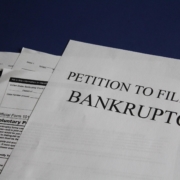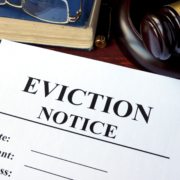With the changes brought about by the COVID-19 pandemic, families have struggled more than ever – and this is evidenced in the strain put onto the housing industry. We live in a state where many maintain surmountable income through investment properties, taking advantage of a thriving rental market bolstered by tourism. It all works very well on a good day but consider the sudden halt many businesses and staple jobs have come to, and you have a market that for many cannot make ends meet.
Luckily on March 18th, measures were taken to begin to try and help the situation. A moratorium was placed that could legally protect effected renters from being evicted. This moratorium, and its consequent extensions have created a murky environment where many do not understand what applies to them, what the end-goal is, and what they will be responsible for when the moratorium is over. In this article, we want to take a deep and current dive into the state of foreclosures, evictions, and the extended moratorium so that you have a better understanding of how we are moving forward together.
The Extensions Continue
As of the writing of this article, the current extension to the moratorium on foreclosures and eviction processes will run until the end of the year, December 31st. Its purpose is to assist homeowners and renters that have undergone financial hardship because of job loss due to COVID-19. From a legal perspective, whenever we see language like this, we are always thinking of the word proof. Pay stubs and any written evidence that can back and prove that you lost your job due specifically to the pandemic will help strengthen your argument. As one would expect, there will be those looking to game the system, so hiring a lawyer to help you through the process is absolutely be a good idea.
In the lending world The Department of Housing and Urban Development (HUD), the Department of Veterans’ Affairs, and the Department of Agriculture have all extended their foreclosure moratoriums on guaranteed or insured loans covered under the CARES Act until December 31st. Fannie Mac and Freddie Mac also have extended their moratorium on foreclosures for enterprise-backed, single-family mortgages. All of this has one main goal, to help stave off sudden, major deterioration of the housing market. Protecting those who are paying rent alongside those who are paying loans off will hopefully allow for time to adjust, catch up, and recalibrate.
Payments Will Be Due
It is vital to understand the implications of these laws. Payments are not being waived. As a matter of fact, the true definition of moratorium is a temporary prohibition of any activity. It, essentially, is a legal pause button, extending but not absolving the money that you owe. If your finances have been impacted by the pandemic, then pivoting will be essential. For those who are impacted in a way that substantially cripples their finances, bankruptcy will have to be a consideration, and that is where hiring a lawyer could work to your benefit. Sophia Dean, legal attorney with The Orlando Law Group, notices a degree of similarity between now and when she helped individuals through the housing crash of 2008.
“When I would consult individuals who were facing immense financial strife, I would encourage them by helping them understand that they were beginning a journey, and that it would take time to get back to where they needed to be. Honestly, many nights I would lay awake with the weight of their situations on my heart, thinking of creative ways for us to build back a foundation.
My advice is do not wait. People make the mistake of thinking that a lawyer will charge you for every second you spend on the phone or in a zoom when the truth is quite the contrary. My consultations are free. A conversation with me is free, and I encourage those struggling to have that conversation and call me immediately. The most important action we will do during this time is make informed decisions.”
Sophia Dean, Attorney at The Orlando Law Group
The Impact On The Real Estate Market
It is a different time for those working in the field of Real Estate, given the changes brought to what was a market with a steady flow of inventory. With less families and individuals putting their property up for sale, prices have gone up. When inventory is low, the power goes to the seller. Lower interest rates have encouraged buyers to enter the market, and we anticipate buyer competition to be fierce, even throughout the pandemic. For an analysis of how COVID-19 has affected the market, we asked Michael Curtin, Commercial Broker of HIVE Commercial Realty his interpretation of the Real Estate Market.
“We’ve seen inventory go down on the residential side, but many commercial opportunities are still growing. With hardship always comes a shift in the market, and this will be no different. I anticipate that we will see many find difficulty making ends meet, and therefore are forced to turn over their real estate portfolios or alter their plans to accommodate the changes brought about by the pandemic.
My biggest recommendation right now – stay flexible with your goals and expectations. If you can grow your business in a creative way to accommodate social distancing, now’s the time to do it. Elevate your marketing and work hard to innovate. Learn the market so that when it begins to change, you can change with it.”
Michael Curtin, Commercial Broker at Hive Commercial Realty
Our Key Takeaways
We are beginning to circle back around to one year since protections were enacted for individuals impacted by the pandemic. With the extensions stretching to December 31st, owners experiencing financial hardship due to COVID-19 may pause, suspend, or reduce mortgage payments for 180 days. If that owner receives forbearance and decides to apply for a second delay, the maximum number of days they can receive forbearance is 360 days total.
This all hints at an unavoidable, eventual elephant in the room. When the eventual resumption occurs, there will be hardship. Many will struggle to make up the money owed, and there will be situations without easy answers. That is why hiring a lawyer and working with a law firm that has experience will be vital. We are poised and ready to help, to lay away at night coming up with options because we care for our clients. We see ourselves in them. We know they live in a complicated world that seldom takes into consideration their concerns. That is why you have us to help you navigate, no matter how murky the waters may seem.








































